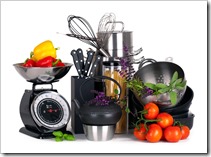Mindless Buying = Mindless Eating?
 For a long time I fantasized about a KitchenAid mixer. I really wanted one. I loved the cool design, the colours it came in (the other week I saw one in orange – amazing!) and I thought about all the goodies I could make with it. However, once we bought an espresso maker that had its home now on the countertop (where else was it going to go?) and I realized that more than anything I liked my counters empty. My kitchen is fairly small, and counter space is hard to come by, so occupying it with “machines” wasn’t going to cut it. My absolute essentials are my coffee and espresso maker and my kettle. The toaster gets taken out of the cabinet when I need it. That’s it!
For a long time I fantasized about a KitchenAid mixer. I really wanted one. I loved the cool design, the colours it came in (the other week I saw one in orange – amazing!) and I thought about all the goodies I could make with it. However, once we bought an espresso maker that had its home now on the countertop (where else was it going to go?) and I realized that more than anything I liked my counters empty. My kitchen is fairly small, and counter space is hard to come by, so occupying it with “machines” wasn’t going to cut it. My absolute essentials are my coffee and espresso maker and my kettle. The toaster gets taken out of the cabinet when I need it. That’s it!
How many appliances do you see when you look around your kitchen? Do you own a toaster oven, maybe a Panini maker, an electric egg cooker? Are you holding onto them because these items were gifts (not a good reason), expensive (you made a mistake), or you thought you always wanted to make Paninis and the reality is you just don’t (we’re all human after all)?
Researcher Brian Wansink Ph.D., director of Cornell University’s Food and Brand Lab, and author of “Why we eat more than we think “ found out that you can actually estimate someone’s weight – without even seeing that person – based on what’s on their countertops. He says that the more appliances, the heavier the people are.
Interesting, isn’t it? The same goes for your refrigerator and pantry – healthy foods up front, not so healthy in the back. We are all lazy and grab the first thing we see. If it’s pop, we drink that.
 Being mindful about what items enter your home is critical – avoid mindless buying. That also applies to food. You always want to be able to see what you have. “Big Box Stores” have great products and prices, however, you have to buy large quantities and if you don’t have the space to store them, this is not the right purchase. Storing items like paper towels and toilet paper all over your home to save a few dollars can lead to total chaos and frustration. Buy the quantity you need at your local supermarket and store it in or close to the area where you need it. For all the various gadgets you have collected over the years, get a box and put them all in there. Only when you use one, does it go back in the drawer. Check back after a month. Whatever is still left in the box can get donated. You won’t need it.
Being mindful about what items enter your home is critical – avoid mindless buying. That also applies to food. You always want to be able to see what you have. “Big Box Stores” have great products and prices, however, you have to buy large quantities and if you don’t have the space to store them, this is not the right purchase. Storing items like paper towels and toilet paper all over your home to save a few dollars can lead to total chaos and frustration. Buy the quantity you need at your local supermarket and store it in or close to the area where you need it. For all the various gadgets you have collected over the years, get a box and put them all in there. Only when you use one, does it go back in the drawer. Check back after a month. Whatever is still left in the box can get donated. You won’t need it.
So the next time you are tempted to buy salad scissors or a shrimp deveiner, picture yourself using these items and if you can’t, maybe use the money to enjoy a good cup of coffee or tea instead!

Leave a Reply